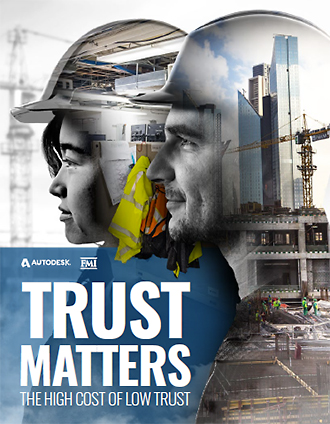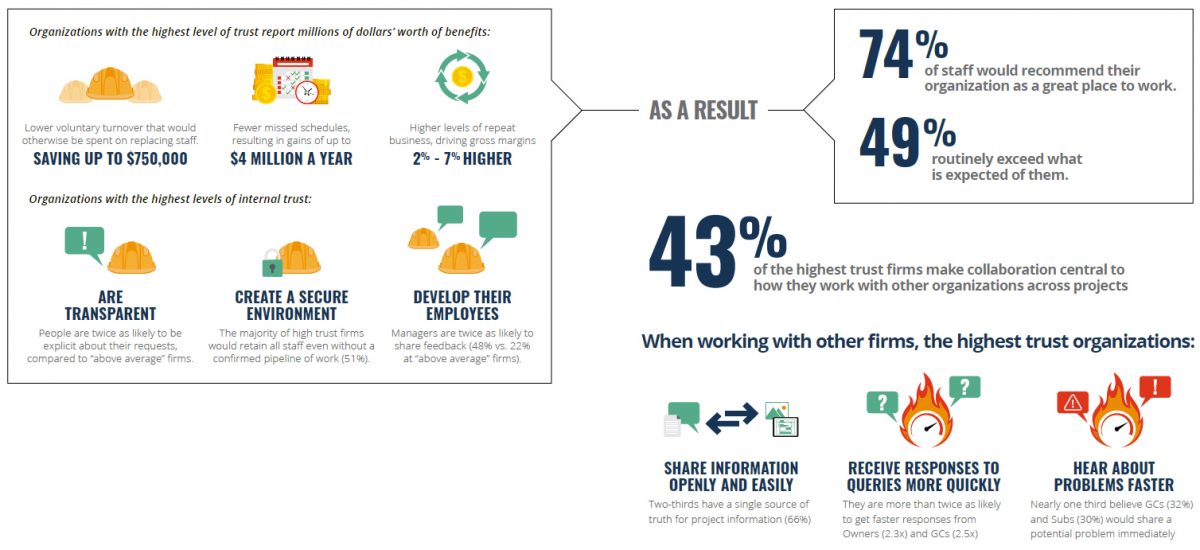Trust Matters: The High Cost of Low Trust

2020 FMI/Autodesk Industry Report
In 2019, Autodesk partnered with FMI to survey over 2,500 construction professionals worldwide. Participants were asked to rank the level of trust within their own organization and between collaborators on projects. The study suggests that businesses and project teams can not only measure trust, but actively improve it. Construction firms can take proactive steps to build stronger relationships, deliver more certain outcomes and, ultimately, improve their profitability.
Executive Summary
It’s no secret. The construction industry experiences waste and inefficiencies. In the US alone, missed schedules cost the industry an estimated $165 billion, or about 17% of the total multifamily, nonresidential building, and non-building construction spending for 2019. Less often measured is the extent to which trust, or lack thereof, contributes to the waste and inefficiencies.
Nearly all construction professionals (93%) report a basic level (average or above) of trust within their organization. Yet, the percentage of organizations with very high levels of trust is notably less.
Only 37% of construction professionals rate their organization as having high levels of trust. There are significant performance gaps between the highest trust and “above average” firms.
High trust firms are half as likely to encounter the problems that commonly arise if data isn’t shared fast enough – 18% say this rarely or never happens. Furthermore, high trust firms are twice as confident about meeting project schedules and budgets. Finally, we found that professionals at high trust firms are the most enthusiastic about taking on repeat work with collaborators across the construction ecosystem.
About the Authors
 Jay Bowman is a principal with FMI. Jay assists a broad range of stakeholders in the construction industry, from program managers and general contractors to specialty trades and materials producers, with the identification and assessment of the risks influencing the strategic and tactical decisions they face. In this role, Jay’s primary responsibilities include research design and interpretation, based on developing an understanding of the context within which these organizations operate. Jay can be reached at [email protected].
Jay Bowman is a principal with FMI. Jay assists a broad range of stakeholders in the construction industry, from program managers and general contractors to specialty trades and materials producers, with the identification and assessment of the risks influencing the strategic and tactical decisions they face. In this role, Jay’s primary responsibilities include research design and interpretation, based on developing an understanding of the context within which these organizations operate. Jay can be reached at [email protected]. Jay Snyder is a technology and innovation leader at FMI. He has industry experience as a construction project executive, corporate director of planning, design and construction for a healthcare system, founder and board member of a risk management tech startup company and as a valued business consultant. Jay can be reached at [email protected].
Jay Snyder is a technology and innovation leader at FMI. He has industry experience as a construction project executive, corporate director of planning, design and construction for a healthcare system, founder and board member of a risk management tech startup company and as a valued business consultant. Jay can be reached at [email protected]. Stahler McKinney is a consultant with FMI. He focuses on conducting primary and secondary research within the construction and design industry. Stahler strives to deliver profound analysis in order to provide actionable insight to FMI clients. Stahler can be reached at [email protected].
Stahler McKinney is a consultant with FMI. He focuses on conducting primary and secondary research within the construction and design industry. Stahler strives to deliver profound analysis in order to provide actionable insight to FMI clients. Stahler can be reached at [email protected].